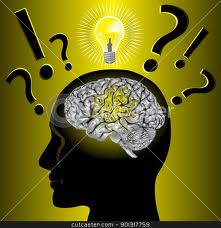Cognitive is the C in CBT and in the context of Cognitive Behavioural Therapy, it means exploring the mental processes that take place in our heads. Examples of cognitions are:
- Thinking
- Remembering

- Problem solving
- Realising
- Day-dreaming
- Beliefs
- Understanding
- Exploring
- Conceptualising
- Perception
- Worrying
- Obsessing
- Ideas
- Dreaming.
These thinking processes are the cause of everything we feel, and the way in which we behave. If we are thinking positive thoughts we feel content and we smile. If we are thinking negative thoughts we feel low and we frown.

CBT helps people to explore these cognitions in order to “root out” the negative automatic thoughts (NATS) that are troubling them. Much of our thinking is below our conscious awareness which means that we may not be able to understand why we experience certain cognitions and why they lead to unwanted feelings and behaviours. By becoming consciously aware of our cognitions, and recognising that negative ones can be challenged and changed into neutral or more positive cognitions, we are in a much stronger position to find equilibrium and contentment.

Remember: If you want to change your life, change your thoughts.
